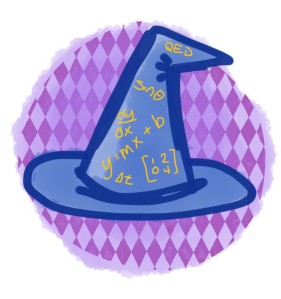
When I was a young mathematics apprentice, learning at the feet of some true numerical wizards, I feared the scarlet letter F would be burned into my forehead like many before me. F for Failure. My grades were good, my test scores were solid, and I picked up topics quickly. Yet I clung to my homework, afraid to turn it in. I would make up excuses like “I forgot it” or “I misplaced it” but the truth was I feared failure.
Chances are, many of you were like me. It may not have been math, but there was some Zone of Fear that dampened your growth in some area. I was bold and not afraid in other areas of my life, but math had my number. (See what I did there?) What I should have done was apply what I learned from my dad on the football field, and applied it to math class. He taught me to “Try your best, you will be glad you did.”
Somewhere in our brains, we don’t ever want to be proven wrong. We balk and drag our feet when new, daring opportunities arise. We would like things to be nice and manageable so that we can be successful. Dr. Carol Dweck wrote an amazing book on this called Mindset: The New Psychology of Success. She identifies this behavior as the Fixed Mindset. Failure means I’m not good enough, that I am dumb and out of my league. Dr. Dweck goes on to explain the Growth Mindset as one that feeds off the challenge, isn’t afraid of failure because that’s when the most learning and growth happens.
“The secret to being wrong isn’t to avoid being wrong! The secret is being willing to be wrong. The secret is realizing that wrong isn’t fatal.” – Seth Godin, Linchpin
The Growth Mindset philosophy blends nicely with strong trends in the startup culture. In startups, and really all innovation, we are supposed to develop quick, minimally viable prototypes to test. You put your innovative hypothesis out there and see if it fails. In fact, I’ve come to love the failures with prototypes more that the successes. Failures give you so much insight into what is and isn’t working, while successes only cast doubt that your idea isn’t innovative enough.
“This is one of the most important lessons of the scientific method: if you cannot fail, you cannot learn.” Eric Reis, The Lean Startup
Losing your fear of failure will feel awkward initially. That first time you tell yourself “Self, it’s ok that I failed because if I don’t know something, it is a chance to learn.” After a short while though, it starts to become second nature. You will start pushing your innovations further. You will beg and plead with the startup muses for a good failure. Not only will you gain valuable learning and find the proverbial “10,000 ways it doesn’t work”, you will also be able to feed those failures to your furnace.
“But I keep cruising. Can’t stop, won’t stop moving. It’s like I got this music, in my mind saying, ‘It’s gonna be alright.'” Taylor Swift, Shake It Off
I was able to overcome my fear of failure in math, and in my innovation work I embrace failure as an old, wise friend. So today is the day that you too start eating failure for breakfast. Shift your brain into a Growth Mindset high gear. Because even if you fail to lose your fear of failure today, you’ll learn a better way to try again tomorrow. Now go forth and be awesome!
Challenge
- When was a time that fear of failure stopped you from going forth?
- Last time you failed, what did you learn?
- How can those lessons help you find a better way for the next iteration?